
by Nicole Melancon (USA) | Sep 2, 2014 | Africa, AIDS, Human Rights, Social Good, Third Eye Mom, World Voice
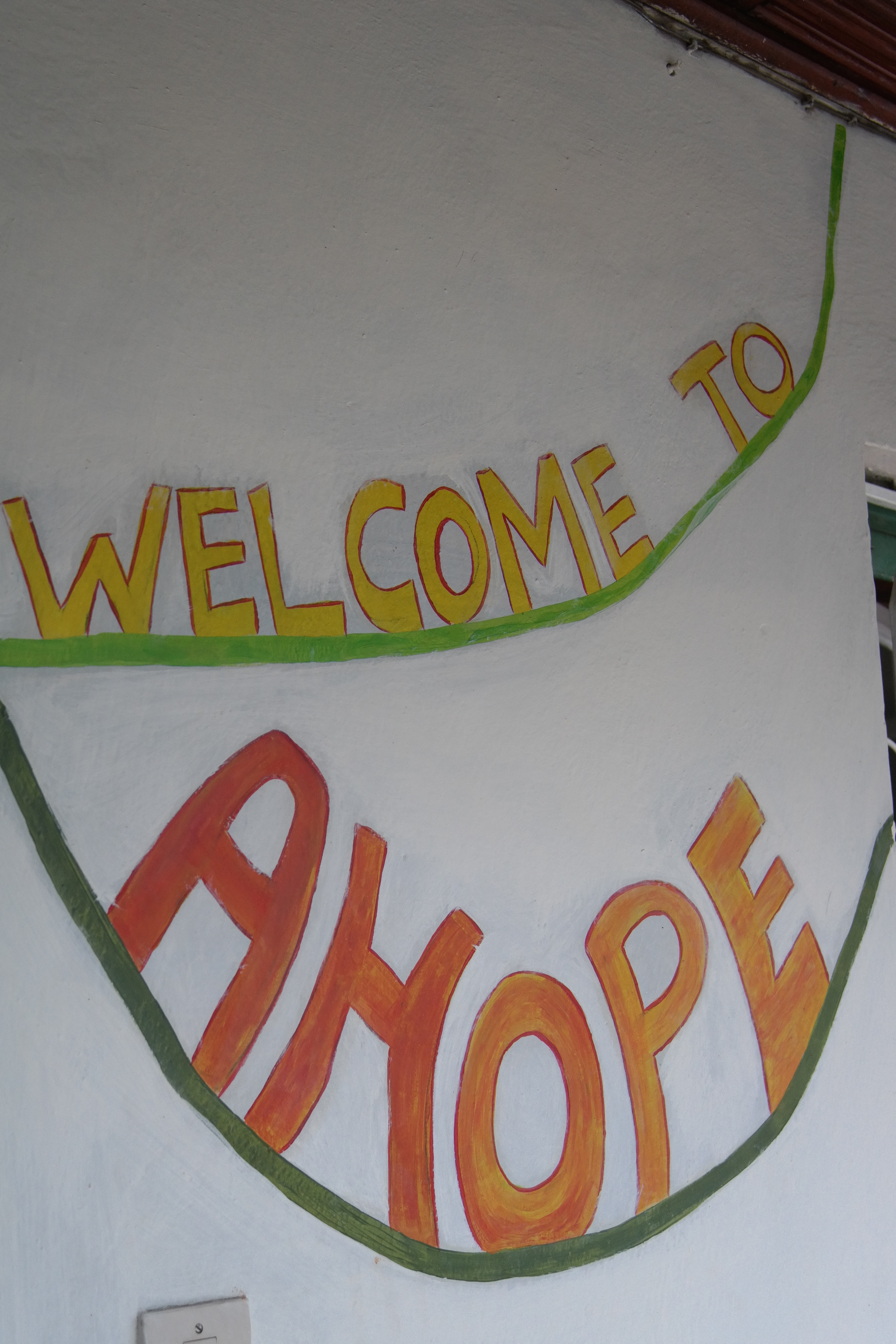 It was a late afternoon in June when Elizabeth Atalay and I, both fellows in Ethiopia with the International Reporting Project, arrived at the nondescript gates of AHOPE for Children on the outskirts of Addis Ababa. The clouds had yet to open up and lash out in their daily angry downpour. But we knew it was coming soon for it was rainy season in Ethiopia.
It was a late afternoon in June when Elizabeth Atalay and I, both fellows in Ethiopia with the International Reporting Project, arrived at the nondescript gates of AHOPE for Children on the outskirts of Addis Ababa. The clouds had yet to open up and lash out in their daily angry downpour. But we knew it was coming soon for it was rainy season in Ethiopia.
I had anticipated this meeting for a long time and was a bit nervous about the world I’d see behind those gates. I had heard about AHOPE for Children after reading the powerful true story of Haregewoin Teferra, a middle class Ethiopia woman who dared to help the growing number of abandoned and orphaned children at the height of the HIV/AIDS epidemic in her country. Award-wining journalist Melissa Fay Greene’s book, “There is No Me Without You” opened my eyes and my heart to the difficult lives of orphaned HIV-positive children and now Elizabeth and I were going to meet some of them.
The impact of HIV/AIDS in Ethiopia is nothing short of heartbreaking. It were statistics like these below that inspired Greene to research the plight of HIV/AIDS orphans in Ethiopia and let the tragedy be known.
Per the United Nations, in 2000 Africa was “a continent of orphans.” HIV and acquired AIDS had killed more than 21 million people, including 4 million children. More than 13 million children had been orphaned, 12 million of them in Sub-Saharan Africa. 25% of those lived in 2 countries: Nigeria and Ethiopia. In Ethiopia, 11% of the children were orphans.
Reading the heart-wrentching stories of the children in Greene’s book left me feeling awfully sad. Yet towards the end of her book, in 2005, the plight of adults and children impacted by HIV/AIDS in Ethiopia and the rest of the developing world changed. Antri-retrovirals (ARVs) which had been widely available in the Western, wealthiest world, had now become available in poorer countries like Ethiopia. The meaning of being HIV positive changed from being a death sentence to a hope to live.
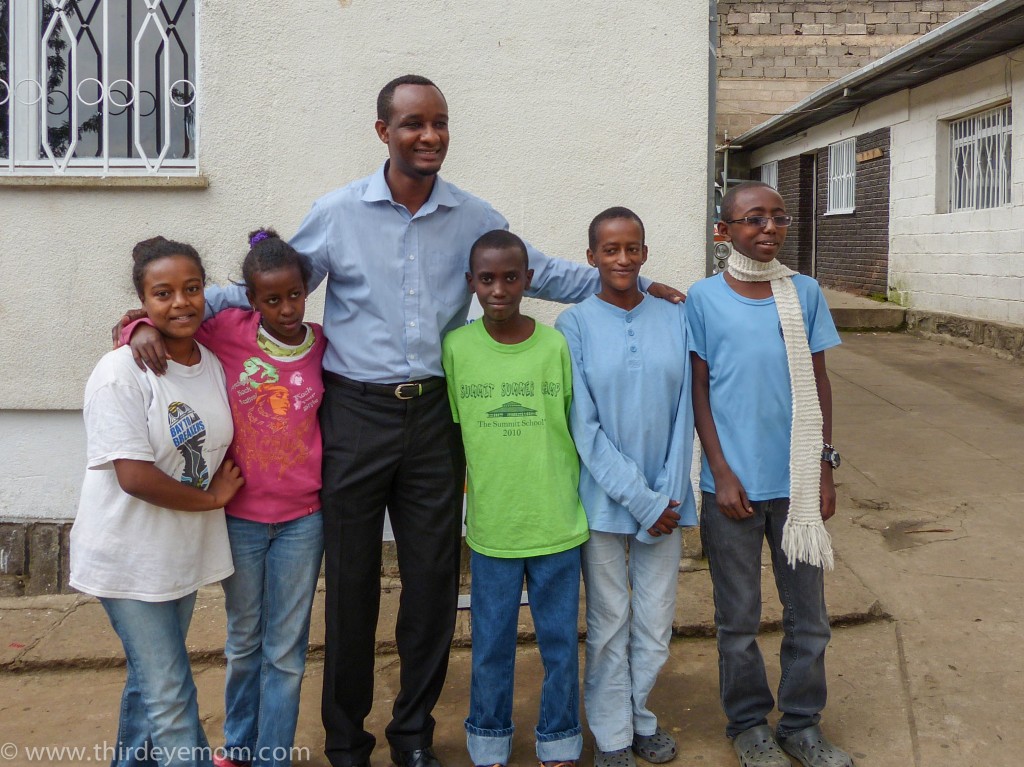
Mengesha, the Director of AHOPE Ethiopia with some of the children.
AHOPE for Children was founded over ten years ago by American Kathy Olsen as an American non-profit charity to assist in the funding of a home for HIV positive children in Ethiopia. AHOPE stands for “African HIV Orphans: Project Embrace” and is the only orphanage in Ethiopia that solely cares for HIV positive children. AHOPE for Children and AHOPE Ethiopia are two separate organizations (AHOPE is based in the US and AHOPE Ethiopia is an Ethiopian non-profit organization) working together to help children with HIV/AIDS. The role of AHOPE for Children is to raise money to support AHOPE Ethiopia; AHOPE Ethiopia is the day to day caring and programs for all of the kids.
AHOPE Ethiopia runs children’s homes, Little AHOPE for younger children, Family Group Homes for older kids, Youth Transition Homes for young adults, and community outreach programs for children impacted by HIV/AIDS. The sole mission of AHOPE is to provide these children with a loving, supportive “family” and prepare them for an independent future while also providing care for HIV.
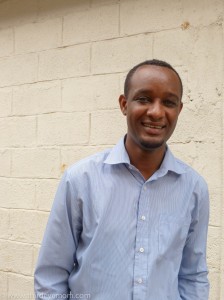
Mengesha, AHOPE Ethiopia’s Director smiles for the camera.
Elizabeth and I met with Mengesha, the Director of AHOPE Ethiopia, at the Little AHOPE compound which is home to 27 children. Currently there are 95 children in AHOPE Ethiopia homes and over 100 children receiving support through AHOPE’s community outreach program.
We entered Little AHOPE to the sounds of children playing outside and were met by several smiles and giggles perhaps a reaction to our blond hair and light skin. At first glance, these children didn’t seem any different than our own. They were playing, singing, jumping and vying for our attention. Yet each one of these children were different as they are all HIV positive, fighting other related illnesses and orphaned.
Our first hour at AHOPE was spent speaking with Mengesha, who has worked at AHOPE for several years and has recently become AHOPE Ethiopia’s Director. Mengesha is a warm, loving man who is passionate about AHOPE and the children. Most of the children at AHOPE are either single or double orphans who have tragically watched one or more parent die from AIDS and has been abandoned with no family member willing or able to care for them. These children have the extra burden of being HIV positive meaning they have many special needs.
AHOPE has a loving, fully trained staff of nurses, pediatricians, care-givers and social workers who ensure each child gets the individual attention, love and care they need. AHOPE aims to provide the children with a sense of belonging to a family and as the children grow, they transition to Family Group Homes. The Family Group Homes are community-based homes run by a “mother” and “auntie” where the kids are integrated into the community. The children attend school, receive their necessary medications, go on field trips and do almost everything else a healthy child would do. Once a child becomes an adult, they move to a Youth Transition Home that prepares 18-24 year olds with independent living.
After Mengesha concluded his overview on AHOPE, it was time for a tour of the home and to meet the children. At first the children were a little bit shy around us however their shyness quickly disappeared as soon as Elizabeth took out her Polaroid camera. The children loved having their photos taken and printed out for them to keep, right before their eyes! Elizabeth was very busy as a queue had formed of excited kids wanting their turn behind the camera.
Meanwhile I got to talk with some of the children and learn about their hopes and dreams. Many of the children had high hopes for their future and all of them wanted to make something out of their life. One teenager said she dreamed of becoming a doctor and helping care for kids like her. HIV positive. Another young boy dreamed of being a teacher. Thankfully, with AHOPE these children all have a hope for the future and an opportunity to be who they want to be.
Some facts on HIV/AIDS and Ethiopia:
▪ An estimated 33.3 million people worldwide are infected with HIV/AIDS.
▪ In 2009, 1.8 million people died due to HIV/AIDS, and another 2.6 mil-lion were newly infected.
▪ More than 68 percent (approximately 22.5 million people) of those infected are in sub-Saharan Africa.
▪ Worldwide, 2.5 million children under 15 are living with HIV/AIDS, and 370,000 were newly infected in 2009.
These are just some of the staggering statistics on the global HIV/AIDS pandemic.
Estimates indicate that in 2009 in Ethiopia approximately 1.1 million people were living with HIV, with a prevalence rate of about 2.3 percent.
Children in Ethiopia are also profoundly affected by HIV/AIDS. In 2009, nearly 73,000 children under age 15 were living with HIV.
Source: AHOPE for Children
Interested in learning more? Here are some excellent resources:
▪ AHOPE for Children’s website
▪ “There is No Me Without You: One Woman’s Odyssey to Rescue her Country’s Children” by Melissa Fay Greene (This book not only tells the true story of Haregewoin Teferra, it also documents some of the believed scientific origins of AIDS, the development and distribution of ARVs, and the plight of AIDS orphans in Ethiopia. It is an excellent book).
▪ A fascinating documentary that can be watched for free over the internet: “And the Band Played On” again documents the discovery of AIDS, the appallingly delayed reaction to do anything, the development of ARVs and the spread of AIDS throughout the world to become one of the worst epidemics Africa has ever seen.
Author Nicole Melancon was in Ethiopia in June as a reporting fellow with the International Reporting Project.

Third Eye Mom is a stay-at-home mom living in Minneapolis, Minnesota with her two children Max (6) and Sophia (4). Her children keep her continually busy and she is constantly amazed by the imagination, energy and joy of life that they possess! A world wanderer at heart, she has also been fortunate to have visited over 30 countries by either traveling, working, studying or volunteering and she continues to keep on the traveling path.
A graduate of French and International Relations from the University of Wisconsin Madison, where she met her husband Paul, she has always been a Midwest gal living in Minnesota, Wisconsin and Chicago. This adventurous mom loves to be outside doing anything athletic (hiking, running, biking, skiing, snowshoeing or simply enjoying nature), to travel and volunteer abroad, to write, and to spend time with her beloved family and friends.
Her latest venture involves her dream to raise enough money on her own to build and open a brand-new school in rural Nepal, and to teach her children to live compassionately, open-minded lives that understand different cultures and the importance of giving back to those in need. Third Eye Mom believes strongly in the value of making a difference in the world, no matter how small it may be. If there is a will, there is a way, and that anything is possible (as long as you set your heart and mind to it!).
Visit her on her blog, Thirdeyemom, where she writes about her travels and experiences in other lands!
More Posts

by Elizabeth Atalay | Jan 14, 2014 | 2014, AIDS, Health, Humanitarian, Malaria, Millennium Development Goals, Social Good, Vaccines, World Moms Blog, World Voice

In 2000, 189 nations made a promise to free people from extreme poverty and multiple deprivations. This pledge turned into the eight Millennium Development Goals, and was written as the Millennium Goal Declaration .- United Nations Development Programme
The goals of MDG #6 are to combat HIV/AIDS, Malaria, and Other Diseases. This month we are thrilled to continue our #Moms4MDG campaign by joining forces with The Bill & Melinda Gates Foundation to take on the topic of preventable infectious diseases.
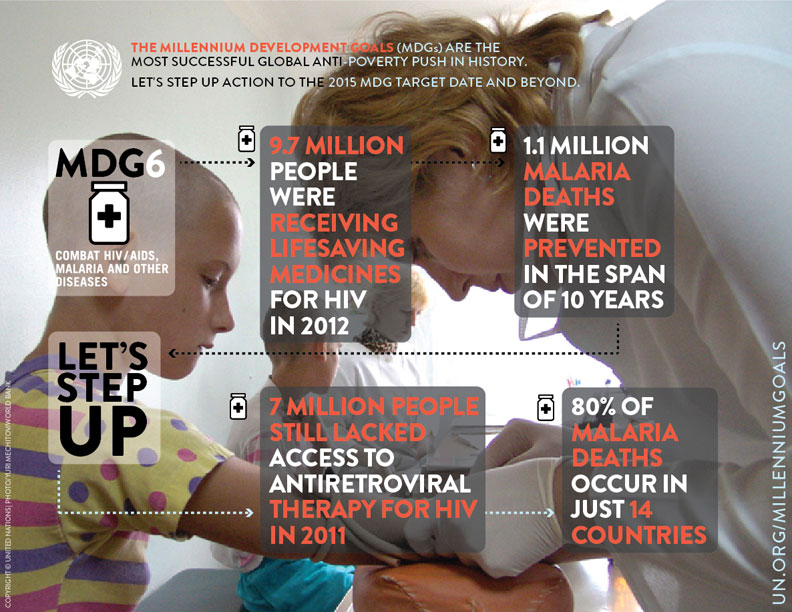
The goals of Millennium Development Goal # 6 are:
- A. To Have halted by 2015 and begun to reverse the spread of HIV/AIDS
- B. By 2010, to have achieved universal access to treatment for HIV/AIDS for all those who need it
- C. To have halted by 2015 and begun to reverse the incidence of malaria and other major diseases
The Bill & Melinda Gates Foundation works tirelessly to support research, solutions and implementation towards improving global health.
Guided by the belief that every life has equal value, the Bill & Melinda Gates Foundation works to help all people lead healthy, productive lives. In developing countries, it focuses on improving people’s health and giving them the chance to lift themselves out of hunger and extreme poverty. In the United States, it seeks to ensure that all people—especially those with the fewest resources—have access to the opportunities they need to succeed in school and life.-www.gatesfoundation.org
Meet us over at the Bill & Melinda Gates Foundation blog Impatient Optimists today to read the guest post by World Moms Blog contributor Erin Threlfall!
We will be co-hosting two #Moms4MDGs Twitter Parties with The Gates Foundation, Multicultural Kid Blogs, InCulture Parent and Girls Globe tomorrow, January 15th at 1-2pm EST and 9-10pm EST, so please join us!
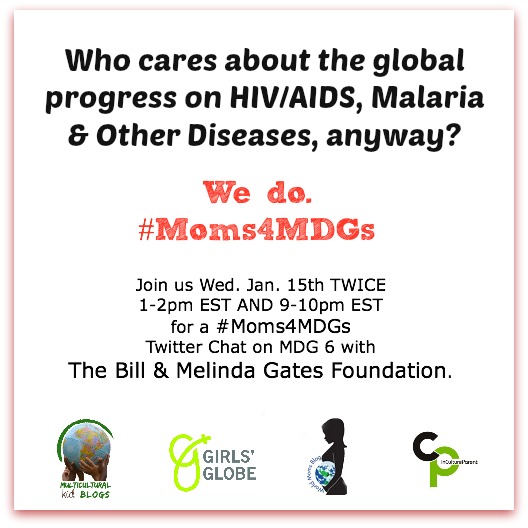
A big THANK YOU, to three amazing sites, Multicultural Kid Blogs, InCulture Parent and Girls Globe for joining us in the rally towards the UN’s Development Goals this month with The Bill and Melinda Gates Foundation!
P.S. Never been to a twitter party before? Go to www.tweetchat.com and put in the hashtag: “#Moms4MDGs during the party times. From there you can retweet and tweet, and the hashtag will automatically be added to your tweets. You can view all of the other party tweets at that hashtag as well!
This is an original post to World Moms Blog by World Voice Editor, Elizabeth Atalay of Documama in Rhode Island, USA.

Elizabeth Atalay is a Digital Media Producer, Managing Editor at World Moms Network, and a Social Media Manager. She was a 2015 United Nations Foundation Social Good Fellow, and traveled to Ethiopia as an International Reporting Project New Media Fellow to report on newborn health in 2014. On her personal blog, Documama.org, she uses digital media as a new medium for her background as a documentarian. After having worked on Feature Films and Television series for FOX, NBC, MGM, Columbia Pictures, Warner Brothers, 20th Century Fox, and Castle Rock Pictures, she studied documentary filmmaking and anthropology earning a Masters degree in Media Studies from The New School in New York. Since becoming a Digital Media Producer she has worked on social media campaigns for non-profits such as Save The Children, WaterAid, ONE.org, UNICEF, United Nations Foundation, Edesia, World Pulse, American Heart Association, and The Gates Foundation. Her writing has also been featured on ONE.org, Johnson & Johnson’s BabyCenter.com, EnoughProject.org, GaviAlliance.org, and Worldmomsnetwork.com. Elizabeth has traveled to 70 countries around the world, most recently to Haiti with Artisan Business Network to visit artisans in partnership with Macy’s Heart of Haiti line, which provides sustainable income to Haitian artisans. Elizabeth lives in New England with her husband and four children.
More Posts

by Alison Fraser | Dec 2, 2013 | 2013, Africa, AIDS, Canada, Education, Girls, Human Rights, Humanitarian, Humanity, Inspirational, International, Kids, Life Lesson, ONE, Philanthropy, Poverty, Preschool, School, Social Good, Spirituality, Women's Rights, World Moms Blog, World Voice

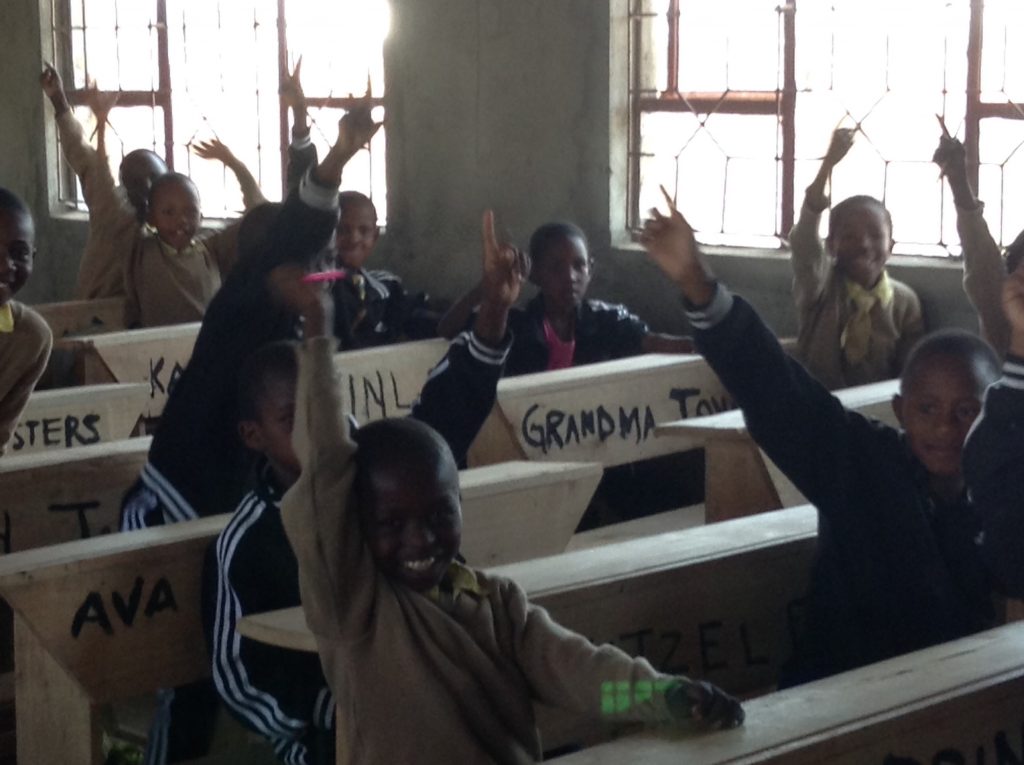
Photo by Alison Fraser
Anne Frank once said “No one has ever become poor by giving”. What a beautiful thought to keep in mind as we celebrate Giving Tuesday on December 3rd of this year. The act of giving can do wonders for a person’s spirit, soul and general well-being. Whether you give time, financial support, a lending hand, a listening ear or encouraging words, the act of giving is unique in that it often benefits the giver as much, or even more, than the receiver. This is something that I can attest to now more than ever before.
A few weeks ago, I visited Tanzania. I run a small Canadian Not for Profit Organization that works to fund the educational needs of women and children in and around Arusha. This was my first trip to Tanzania and the first time to meet all of the wonderful families that are involved in my organization. Helping these families has always made me feel good. I always felt like it was an equal partnership where I would provide financial assistance through fundraising in Canada and the Tanzanian women and children would allow me a glimpse into their life from afar. However, what I realized from spending ten days with these amazing people is that the partnership really isn’t equal at all. In fact, I truly believe that what I have received from these incredibly strong, spiritual, kind, compassionate and caring families is much more than what I have given them.
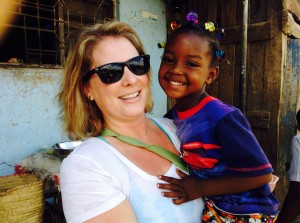
The author with a student in Tanzania.
Let me explain how the power of giving has changed my life. I donate countless hours of time to help those in the Mom2Mom Africa organization. Why? It makes me happy.
It fulfills me in ways that I can’t explain. I feel a sense of purpose, like I am making a difference, albeit very small, but nonetheless, a difference in the world. My charity work completes me and makes me feel like a whole person. I can’t explain why…it just does. But, the ten days that I spent in Tanzania last month, visiting families and spending time at the schools has changed my life forever. I have never experienced anything so powerful in all of my life. Yes, I gave up family time to spend in Tanzania and I gave up quite a bit financially to pay for the trip. But, NOTHING could prepare me for what I was given in return. My life has been changed by simply spending time with these families over the course of my time in Africa. They breathed fresh air and a new life into me by just being themselves. Their sense of community, their compassion towards one another, and their love of life despite many struggles has inspired me in ways that I still have yet to process and understand. The power of giving has never been more apparent to me. It can change lives. It has changed mine.
Today, on Giving Tuesday, I am begging you to give of yourself. Whether it be time, a lending hand or financial assistance…give.
Give to someone who may need your help, whether it be across the ocean or right in your backyard. What you will get back in return will outweigh what you have given. I can promise you that. Giving of oneself has the power to change the world in so many ways. It is reciprocal. What you put into giving, will come back to you in abundance.
That is the power of giving. Giving changes all lives involved. As Anne Frank also said, “How wonderful it is that nobody need wait a single moment before starting to improve the world”. So give. Change the world. You can do it. What may seem like a small act of giving can mean a world of difference to someone else.
On this Giving Tuesday, consider helping a family in Tanzania by purchasing a personalized desk for our schools, school uniforms, or school textbooks. You will bring a smile to the face of a child in Tanzania. And that, I guarantee, will bring a smile to your face, as well! Happy Giving Tuesday!
How do you plan to give back this Giving Tuesday?
This is an original post for World Moms Blog Written by Alison Fraser.
Alison Fraser is the mother of three young girls ranging in age from 5 to 9 years old. She lives with her family in Cambridge, Ontario, Canada. Alison works as an Environmental Toxicologist with a human environment consulting company and is an active member of the Society of Environmental Toxicology and Chemistry (SETAC). She is also the founder and director of the Canadian Not for Profit Organization, Mom2Mom Africa, which serves to fund the school fees of children and young women in rural Tanzania. Recently recognized and awarded a "Women of Waterloo Region" award, Alison is very involved in charitable events within her community including Christmas Toy and School Backpack Drives for the local foodbank.
More Posts - Website
Follow Me:



by Elizabeth Atalay | Nov 26, 2013 | 2013, Africa, AIDS, Health, ONE, World Events, World Moms Blog
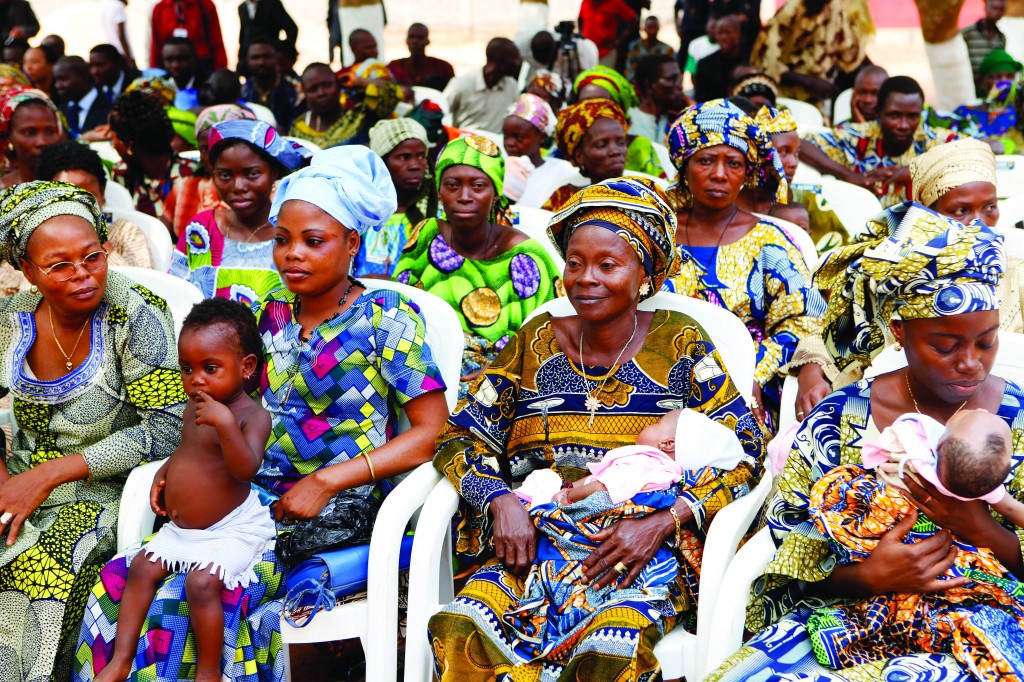
A community meeting of HIV-positive women who have benefitted from prevention of mother-to-child transmission (PMTCT) services and health counselors in Dangbo, Benin. Through the expanding availability of these services, it is now possible to imagine a generation of children being born free from HIV.- photo credit The Global Fund
Optimistic news was released today in the annual accountability report on AIDS by ONE. The highlight is that the sweeping statement “AIDS in Africa” has now become obsolete. African countries are shown in this new report to have made such widely varied progress in the fight against AIDS that the generalization of the continent as a whole no longer makes sense. At this point there are 16 countries in Sub-Saharan Africa that have reached the tipping point of being at the beginning of the end of AIDS. At the same time, other countries are still far behind in the struggle against the disease.
On the 25th World AIDS Day marked on December 1st of 2013, ONE’s new report on the global AIDS fight shows we are closing in on the tipping point.
According to ONE’s 2013 analysis: If current rates of acceleration continue, we could achieve the beginning of the end of AIDS – when the number of people newly added to treatment surpasses the number newly infected with HIV by 2015
Ironically, the AIDS fight has lost some political momentum because of its many successes. Because it is no longer perceived as a global health emergency, but rather a chronic and manageable disease, the fight has lost some of its political momentum. Along with the financial commitment, political leadership at the national and local levels has proved to be essential in driving real gains across the continent.
The three key targets outlined in the report where world leaders should focus significant attention in order to make headway against the disease are:
- The virtual elimination of mother-to-child transmission of HIV by 2015
- Access to treatment for 15 million HIV-positive individuals by 2015
- The drastic reduction of new adult and adolescent HIV infections, to approximately 1.1 million or fewer annually, by 2015.
The data in the assessment breaks down the progress of nine African countries and where they stand in meeting the 2015 goals:
leading the Way: Ghana, Malawi and Zambia are great examples of how international donors, national governments and key civil society leaders can work together to achieve accelerated progress in the fight against AIDS. Zambia and Malawi entered the decade with two of the world’s most widespread, crippling AIDS epidemics. Today, they – along with Ghana – are the world’s leaders in ending the epidemic, having made swift and steady progress over the last few years. All three countries have committed significant national resources for health, have reached and surpassed the tipping point at the country level, and are making even further headway towards the control and defeat of the disease.
ones to Watch: South Africa, Tanzania and Uganda have shown real dynamism but erratic progress as they face massive disease burdens, shifting political landscapes and unique, country-specific challenges. These countries have made significant strides in recent years, but their progress has been slower than in the leading countries. South Africa and Tanzania hit the tipping point for the beginning of the end of AIDS for the first time just last year, and Uganda – with an AIDS ratio of 1.1 – is close to the tipping point but has yet to reach it. Given unsteady progress against the AIDS epidemic in recent years, how these countries move forward in the next 1–2 years will be crucial.
Urgent Progress needed: Cameroon, Nigeria and Togo have not made enough progress, having often been hampered by a lack of political will or competing political priorities, insufficient financial commitments, inefficient delivery systems and a lack of specific attention to prevention. Togo, in particular, had reached the AIDS tipping point in 2010 but has slipped back since. Meanwhile, progress towards the beginning of the end of AIDS has been largely stagnant in Nigeria and Cameroon, albeit with dramatic year-to-year fluctuations in the AIDS ratio. These countries, and others like them, must show a serious acceleration of efforts to achieve the beginning of the end of AIDS by 2015.
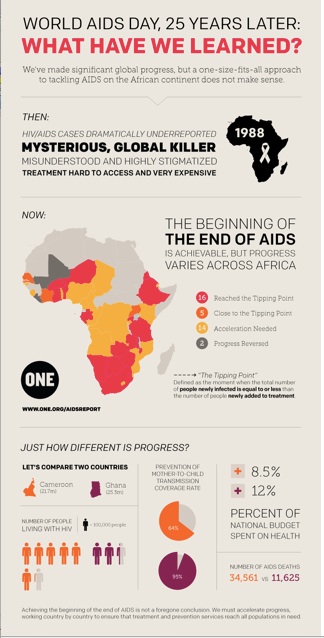
Despite the overall positive progress made in the fight against AIDS the momentum needs to continue to win. Prevention of new infections is key, transparency in reporting, political involvement, targeted resources, and keeping the AIDS issue in the forefront of the global agenda are all critical to the success of this campaign.
This is a big week for the AIDS community, with a hugely successful (RED) auction this past Saturday night, the 25thWorld AIDS Day, and the Global Fund replenishment. The (RED) auction on Saturday raised $13 million which was matched by Bill and Melinda Gates for a total $26 million for the Global Fund. Let’s keep the momentum going!
To learn more you can read the full report
here.
About ONE
Co-founded by Bono, ONE is a campaigning and advocacy organization of more than three million people taking action to end extreme poverty and preventable disease… because the facts show extreme poverty has already been cut in half and can be virtually eradicated by 2030.
ONE does not ask for your money, but for your voice.
Find out more at ONE.org
This is an original World Moms Blog post written by Elizabeth Atalay of www.documama.org. All information comes from The Beginning of The End? Tracking Global Commitments On AIDS Volume 2 ONE Data Report.
- A community meeting of HIV-positive women who have benefitted from prevention of mother-to-child transmission (PMTCT) services and health counselors in Dangbo, Benin. Through the expanding availability of these services, it is now possible to imagine a generation of children being born free from HIV.- photo courtesy of ONE.org

Elizabeth Atalay is a Digital Media Producer, Managing Editor at World Moms Network, and a Social Media Manager. She was a 2015 United Nations Foundation Social Good Fellow, and traveled to Ethiopia as an International Reporting Project New Media Fellow to report on newborn health in 2014. On her personal blog, Documama.org, she uses digital media as a new medium for her background as a documentarian. After having worked on Feature Films and Television series for FOX, NBC, MGM, Columbia Pictures, Warner Brothers, 20th Century Fox, and Castle Rock Pictures, she studied documentary filmmaking and anthropology earning a Masters degree in Media Studies from The New School in New York. Since becoming a Digital Media Producer she has worked on social media campaigns for non-profits such as Save The Children, WaterAid, ONE.org, UNICEF, United Nations Foundation, Edesia, World Pulse, American Heart Association, and The Gates Foundation. Her writing has also been featured on ONE.org, Johnson & Johnson’s BabyCenter.com, EnoughProject.org, GaviAlliance.org, and Worldmomsnetwork.com. Elizabeth has traveled to 70 countries around the world, most recently to Haiti with Artisan Business Network to visit artisans in partnership with Macy’s Heart of Haiti line, which provides sustainable income to Haitian artisans. Elizabeth lives in New England with her husband and four children.
More Posts

 It was a late afternoon in June when Elizabeth Atalay and I, both fellows in Ethiopia with the International Reporting Project, arrived at the nondescript gates of AHOPE for Children on the outskirts of Addis Ababa. The clouds had yet to open up and lash out in their daily angry downpour. But we knew it was coming soon for it was rainy season in Ethiopia.
It was a late afternoon in June when Elizabeth Atalay and I, both fellows in Ethiopia with the International Reporting Project, arrived at the nondescript gates of AHOPE for Children on the outskirts of Addis Ababa. The clouds had yet to open up and lash out in their daily angry downpour. But we knew it was coming soon for it was rainy season in Ethiopia.


















